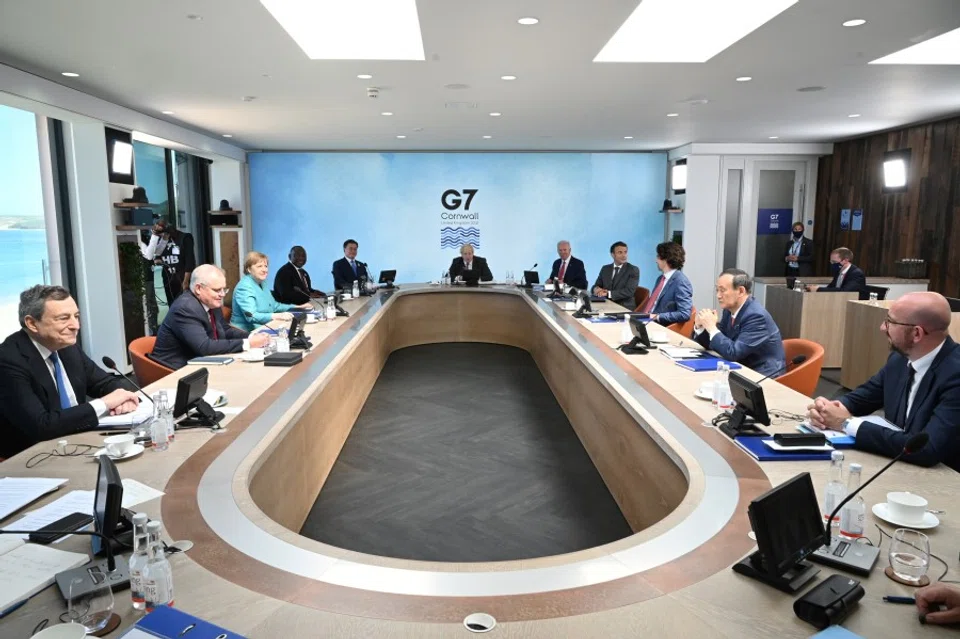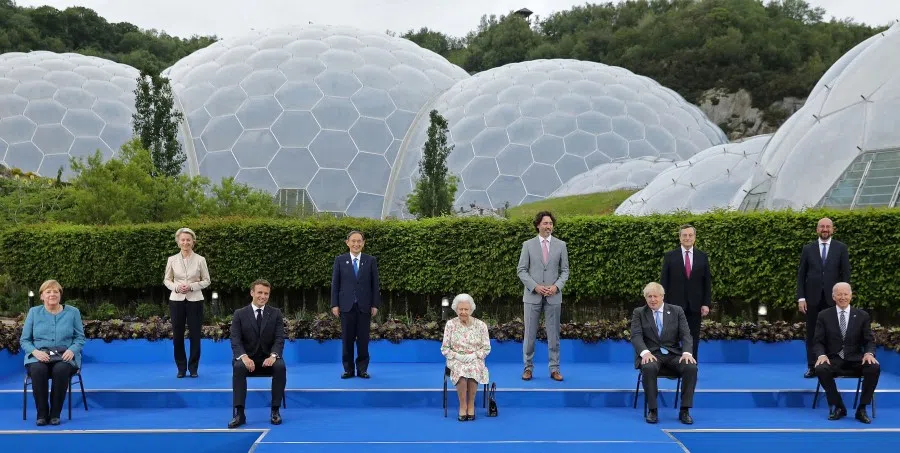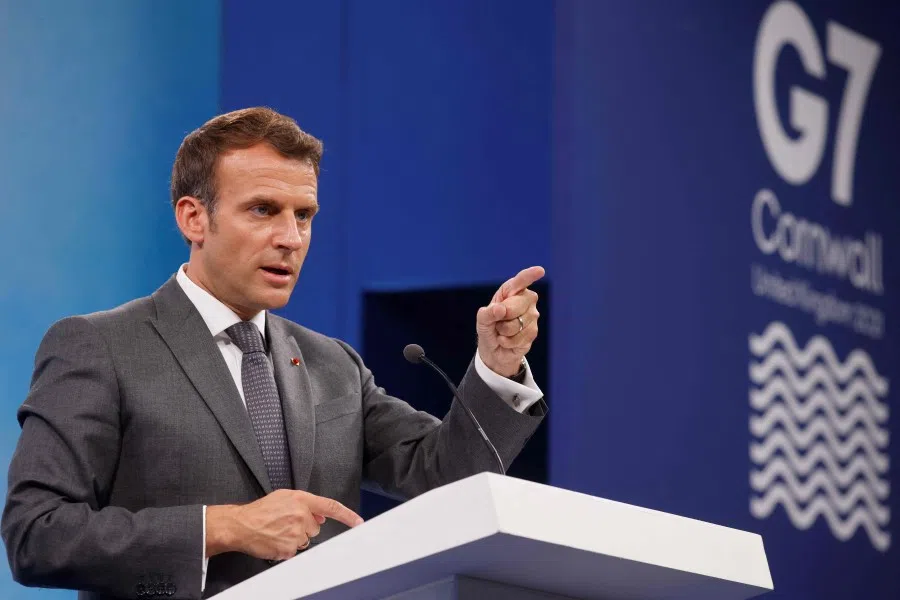D10 group of democracies: A stronger alliance to contain China?
Chinese PhD candidate Du Zhiyuan notes that the recent G7 summit in the UK involving G7 members and guests was in fact a gathering of a "D10" club of democratic partners, along the lines proposed by British PM Boris Johnson. And the D10, in turn, could ultimately lead to a trans-Atlantic/Indo-Pacific alliance better fit to contain China.

On 29 May 2020, British Prime Minister Boris Johnson proposed a "D10" club of democratic partners, based on G7 plus India, South Korea, and Australia, to counter the threat from China. When talking about expanding the Quadrilateral Security Dialogue (Quad) comprising the US, Australia, India and Japan, the Biden administration also supported the idea of a D10, and said that the US needs its allies and partners to come together to counter the "China challenge".
The leaders of the UK and US have similar ideas in wanting to build a select alliance to contain China. With the push from both countries, the G7 and Quad leaders who were present met on 11 June 2021 at the G7-plus summit in the UK. While there was no public news on the D10, looking at the participants and official statements, the G7-plus summit was basically a meeting of the D10.
A conduit for covert meetings?
After resolving issues of Australia wanting to pull out and India's hesitance, the Quad took shape quickly, and moved towards becoming an "Asian NATO"; but the Quad's anti-China nature also limited its expansion and regional legitimacy. Countries like South Korea and the UK have wanted to leverage the Quad for their political and economic needs - using its geographical and economic benefits, and balancing relations with China.
However, all this is restricted by the anti-China nature of the Quad; but the D10 provides an opportunity. South Korea and the UK are members of the D10, which means they - and other countries - can quietly join the Quad-plus through the D10, without worrying about damaging relations with China. Furthermore, Japan can also quietly join the Five Eyes alliance through the D10.
The emphasis on having the Indo-Pacific countries such as India, South Korea, and Australia as part of the D10, shows that non-regional countries like the UK, Germany, and Canada are moving into the Indo-Pacific region, and are seeking legitimacy and strategic independence there.

Seeking legitimacy in the Indo-Pacific region
Apart from France which has foreign territories in the South Pacific, non-regional powers like the UK, Germany, and Canada do not have legitimate sovereignty in the Indo-Pacific, and can only build relations with countries in the region and normalise their presence through mutual interactions. Bringing the main Indo-Pacific countries and the Quad into the D10 is a workable strategy. And so, the G7 is strengthening relations between the Quad countries through the D10 to legitimately move into the Indo-Pacific region and build a basis for its presence.
The success of the D10 is not just because it poses a collective strategic deterrent, but also because the multipolar internal arrangement can balance out dominance by big countries, which is in line with the strategic autonomy sought by members such as the EU, the UK, Japan, and India.
The UK, France, Germany, and the Netherlands have proposed their own Indo-Pacific strategy. The emphasis on having the Indo-Pacific countries such as India, South Korea, and Australia as part of the D10, shows that non-regional countries like the UK, Germany, and Canada are moving into the Indo-Pacific region, and are seeking legitimacy and strategic independence there.
If South Africa and Brazil were included, that would mean representation for all the main continents, and the D10-plus would be a "United Nations" of the Western world.

Integrating various frameworks and systems
Competition between major powers is a long process; building a first-mover advantage and uniting the team means having to build an elite leadership of the Western world, and the D10 was born of this idea. But in the end, the result of great power competition is not just dependent on first-mover advantage. Growing the reserve strength as well as the team is even more important. The D10-plus would provide a platform for consolidation and expansion, while expanding and legitimising the system.
Prior to this, former US President Donald Trump also suggested reforming the G7 and bringing in India, Australia, South Korea, South Africa, and Brazil to form the "G10/G11". If South Africa and Brazil were included, that would mean representation for all the main continents, and the D10-plus would be a "United Nations" of the Western world. The UK's invitation to South Africa to participate in the summit might well have been to explore the model of the main democracies plus representation for two major continents.
Another point is connecting and integrating the various mechanisms and ecosystems. The trilateral cooperation between India, France, and Indonesia, the Supply Chain Resilience Initiative between India, Japan, and Australia, and trilateral cooperation between India, France, and Australia might all be subsumed under the D10-plus framework, and developed into a "networking hub" of the Western world.
With the D10 as the core, it will bridge relations between the US, UK, and Europe, build trans-Atlantic and Indo-Pacific relations, drive a trans-Atlantic/Indo-Pacific alliance, and form a strong unit to contain China.

A stronger alliance?
In this post-Brexit era of great power competition, on the micro-level, how to bring the US, UK, and EU back together; and on a macro level, how to build trans-Atlantic and Indo-Pacific relations, are the two main questions faced by the Western alliances. These are challenges that the G7 and the Quad each on their own cannot resolve. As Andrew Latham of Macalester College wrote in The Hill, this era of great power competition is distinctive, and what is needed is a new institution that not only coordinates policy but enhances the capacity of the world's democracies for practical cooperation in various domains, and the D10 might be a good start.
James Rogers of the Council on Geostrategy also feels that the G7 has lost a lot of its geopolitical legitimacy. The G7 is mainly centred on the Europe-Atlantic region, while the Indo-Pacific region is increasingly becoming the centre of global economic activity and the main arena of geopolitical tussling, and so there is a need to expand the G7 to include the Indo-Pacific region.
With the D10 as the core, it will bridge relations between the US, UK, and Europe, build trans-Atlantic and Indo-Pacific relations, drive a trans-Atlantic/Indo-Pacific alliance, and form a strong unit to contain China.





